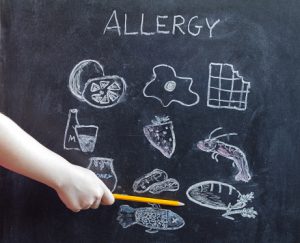 May has been designated as Food Allergy Action Month in an effort to educate Americans about food allergies and to support those who suffer from them.
May has been designated as Food Allergy Action Month in an effort to educate Americans about food allergies and to support those who suffer from them.
Recent surveys indicate that 15 million Americans now suffer from food allergies. This number indicates that food allergies are much more common than previously believed and the number of people with allergies is steadily growing. It is now estimated that one out of every 13 children has a food allergy.
An allergic reaction occurs when the body’s immune system mistakenly identifies a food component as a hazardous substance and attacks it. The effects of food allergies may appear on the skin, in the respiratory passage, or in the gastrointestinal tract. The symptoms of food allergies may vary from mild to severe, and in extreme cases, they can even be fatal.
Minor reactions include:
• Skin rash
• Eczema
• Diarrhea
• Stomach cramps
• Nausea
Serious Reactions Include:
• Obstructive inflammation of the tongue and respiratory tract
• Panting and wheezing
• Lack of oxygen, leading to blue lips
• Unconsciousness
• Drop in pulse rate
Anaphylaxis is a very serious allergic reaction that can cause death. This type of allergic reaction requires immediate action and medical attention. If you or a loved one has a severe food allergy, you must be prepared for an emergency. Learn the signs and symptoms of anaphylaxis and know what the emergency care plan is. It may include the administration of epinephrine, a life-saving drug.
Over 170 different foods have been reported to cause an allergic reaction, but the food products that cause the most reactions are:
• Soy
• Milk
• Fish / Shellfish
• Peanuts / Tree Nuts
• Eggs
• Wheat
There is currently no cure for food allergies. To prevent an allergic reaction, it is important for the person with the allergy to stay away from foods that cause symptoms. Contact with even the smallest amounts of the allergen can cause serious problems. To avoid an allergic reaction, take the following precautions:
• Learn to carefully read food labels and ask about ingredients in prepared foods
• Wash your hands with soap and warm water before and after touching food
• Use clean, uncontaminated utensils when preparing foods
• Educate others about food allergies.
Every year in the United States, approximately 30,000 individuals are brought to hospital emergency departments and 150 people die due to severe allergic reactions. Jamaica Hospital joins the effort to raise awareness about food allergies and urges everyone to learn more about this growing, yet manageable issue.
All content of this newsletter is intended for general information purposes only and is not intended or implied to be a substitute for professional medical advice, diagnosis or treatment. Please consult a medical professional before adopting any of the suggestions on this page. You must never disregard professional medical advice or delay seeking medical treatment based upon any content of this newsletter. PROMPTLY CONSULT YOUR PHYSICIAN OR CALL 911 IF YOU BELIEVE YOU HAVE A MEDICAL EMERGENCY.
